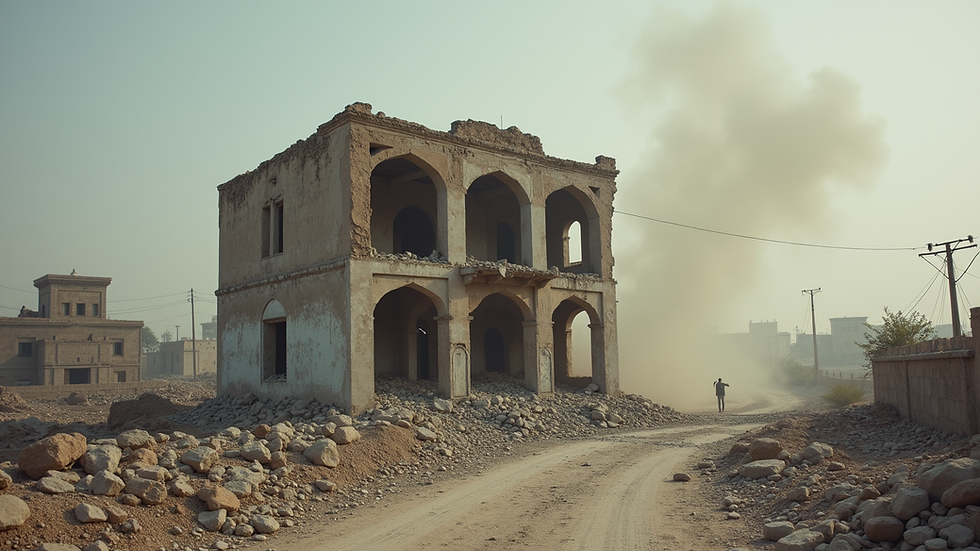In the Shadows of Conflict: Urgent Call to Save Gaza's Children from Starvation and Violence
- E Linde
- Aug 17
- 3 min read
The ongoing conflict in Gaza has cast a dark cloud over the lives of its youngest inhabitants. As the world looks on, children find themselves trapped in a cycle of violence and deprivation that is heartbreaking and unacceptable. This post aims to highlight the urgent situation faced by Gaza's children, who suffer not only from the horrors of war but also from the grim reality of starvation.
This call to action is for everyone. We need to raise awareness, advocate for humanitarian aid, and demand resolutions to the conflict that prioritize the safety and well-being of the most vulnerable among us.
The Humanitarian Crisis in Gaza
Gaza is experiencing a humanitarian crisis of staggering proportions. With ongoing military operations, the infrastructure necessary for daily life has been severely damaged. Hospitals are overwhelmed, with a 50% shortage in essential medical supplies reported by UNICEF. Furthermore, access to clean water and food is critically limited. Approximately 1.8 million people, nearly 90% of Gaza's population, are in urgent need of assistance, with children bearing the brunt of this crisis.
The blockade has worsened the situation, restricting the flow of vital goods. Families struggle to provide for their children, leading to alarming rates of malnutrition. According to recent statistics, nearly 40% of children in Gaza are experiencing acute malnutrition. The psychological consequences are equally dire, with many children suffering trauma that can last a lifetime.

The international community has a duty to respond to this crisis. While humanitarian organizations are tirelessly delivering aid, they face a monumental challenge. The demand for support far exceeds the available resources. Activists and concerned citizens must rally efforts to advocate for policies that prioritize the welfare of children in conflict zones.
The Impact of Starvation on Children
Starvation is a silent crisis that disproportionately affects children. Malnutrition can lead to stunted growth, weakened immune systems, and cognitive impairments. In Gaza, where food is scarce, many children are at risk of facing long-term health consequences that hinder their future prospects.
The psychological effects of food insecurity are alarming. Children experiencing hunger often face anxiety, depression, and a pervasive sense of hopelessness. Studies show that children from food-insecure households have a 20% lower academic performance compared to their peers. This cycle of poverty and despair continues for generations.

Combatting starvation requires immediate and long-term efforts. While providing emergency food aid is essential, supporting local agriculture and improving market access are crucial for sustainable solutions. Programs that train families in food production techniques can help create food security and empower communities in Gaza to become self-sufficient.
The Role of Activism in Addressing the Crisis
Activism is vital in raising awareness and mobilizing support for the children of Gaza. Grassroots movements, advocacy campaigns, and social media initiatives can illuminate the plight of these children, urging governments to take action.
Activists can connect with humanitarian organizations working on the ground in Gaza. Supporting these organizations directly helps provide food, medical care, and psychological support to vulnerable children. For example, organizations like Save the Children reported distributing over 1 million food packages in Gaza throughout 2022.
Additionally, it is crucial to engage in discussions about the broader political context of this conflict. Understanding the root causes of violence and advocating for peaceful resolutions can create a more stable environment for children to grow up in.

The Importance of International Support
International support remains essential in addressing the humanitarian crisis in Gaza. Governments, NGOs, and individuals must unite to provide aid and advocate for children's rights. Actions include pressing for an end to the blockade, ensuring access to vital services, and holding those responsible for violence accountable.
Donations to reputable organizations that provide humanitarian aid are incredibly impactful. Just $50 can provide a month’s worth of food for a family living in Gaza. It is also important to raise awareness through social media campaigns and community events to mobilize further support for the cause.
Time to Take Action
The children of Gaza face unimaginable hardships, and it is our shared responsibility to respond. We must raise our voices, advocate for change, and support humanitarian efforts aimed at alleviating their suffering.
The time to act is now. By joining forces, we can ensure that Gaza's children are not forgotten amid conflict. Let us stand in solidarity with them and strive towards a future where every child can grow up in peace, free from the threat of violence and starvation.
Together, we can make a difference. Let us be the change that these children so desperately need.


Comments